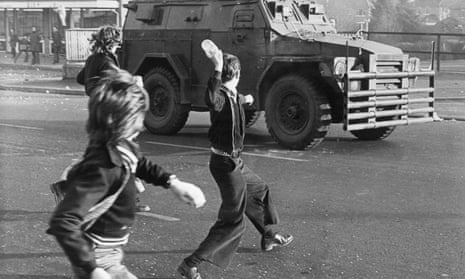In Northern Ireland, there are now many fine young and emerging writers whose attentions have turned away from the subject of the Troubles: the poet Stephen Sexton, recent winner of a Forward prize; or Wendy Erskine, whose short-story collection Sweet Home is all about Belfast, but not that Belfast. Others, meanwhile, are finding new ways of looking back at recent history, including Anna Burns with her Booker-winning Milkman and Michael Hughes with his modern take on the Iliad, Country. Henry McDonald’s novel Two Souls provides another new and surprising perspective.
McDonald is a journalist who has been writing about Northern Ireland for the Guardian and the Observer for 30 years or more. His previous books include Martin McGuinness: A Life Remembered (2017) and a history of the UVF: basically, he has covered all the territory. Originally from the Markets area of Belfast – and thus familiar with the effect of the Troubles on the city’s working-class communities, as documented in his autobiographical Colours (2004) – he knows whereof he speaks. In Two Souls he speaks from the perspective of middle age to provide a nuanced coming-of-age story, set against the backdrop not only of the Troubles, but of the explosion of punk and the world of Irish League football.
There is a term sometimes used in Northern Ireland to describe literature that merely trades in the tropes of the Troubles: it’s called Troubles trash. Two Souls rummages around in the rubbish but emerges with something rather strange and precious.
It’s the late 1970s. The book’s hero – who more than a little resembles the McDonald from Colours – is Robbie “Ruin” McManus. Robbie is finishing his A-levels and yearning for a new start in life. “After seven long years, I will be free from the stench of floor polish; free from cassocked Christian Brothers with their Embassy No 10 fegs […] free from the dead-on teachers in their moccasins and corduroy suits; free from the Yes and Pink Floyd fans who control the record players in the Sixth Form centre.”
But this being Belfast, things are rather more complicated: it’s not all post-punk discos, exam stresses and Subbuteo leagues. (Although there is a nice reminder about the importance of the table-top football game to 70s youth: “We played in our front rooms, often on our bellies, flicking and kicking […]while the bullets whizzed past our windows.”)
One of the book’s many complications – which eventually has long-term catastrophic consequences for Robbie – is the problem of the rivalry between the so-called Stickies or official IRA, and the Provisional IRA, which threatens to divide working-class republican families. Then there’s the small matter of Robbie’s best friend being a half-crazed football hooligan, “Padre Pio” McCann, “a stumpy wee cunt” whose Provo father messed up and had to leave the North, and who therefore has a lot to prove. Plus, Robbie’s cousin Aidan has arrived from England, complete with Mohican and a biker jacket stencilled with an image of a horned goat and a pentagram, bringing an entirely new kind of rebellion. And Robbie also happens to have fallen hopelessly in love with a beautiful art student called Sabine, whose father, inevitably, turns out to be a British soldier.
Sometimes the chronology of the book becomes confused, moving backwards and forwards from the 70s through the 80s and into the 90s; an understanding of the novel’s denouement relies on a careful reading of a series of cryptic communications from a mysterious imprisoned Comrade T. What maintains the momentum is McDonald’s capacity to create scenes of disturbing incident – beatings, confrontations, betrayals – and his obvious relish in rendering the endless insults and hilarious slaggings of Belfast youth: “That wee fucker has game, I’ll give him that.”
The notion of being or having game is extremely important to the book: as much as anything, this is a novel about the importance of performance, of self-presentation and self-dramatisation in all sorts of cultures, good and bad. “In Belfast you might be the biggest windy-licking, back-stabbing, touting, double-crossing, thieving, hooding, joyriding wee bastard, but if you’re game then all will be forgiven. Once you prove you’re game, you get respect … and maybe fear.” No one could doubt that Henry McDonald is game.
